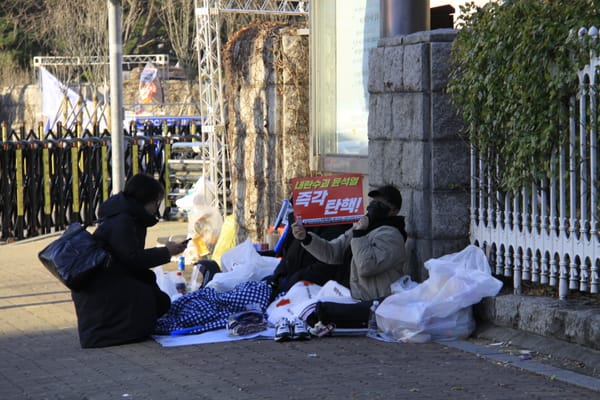Undercovered in 2019: Special year-end Issue
The goal of Asia Undercovered is simple – provide an alternative to the incessant Trump-focused media coverage, and highlight the Asian trends, people and stories that are not getting enough global attention. Every week I highlighted stories from across the continent, usually by local journalists in countries or regions that are not on the mainstream media radar.
Unfortunately, I know that Asia coverage in 2020 will be even more lacking due to the US Presidential election, which will suck up all the airtime and attention. Can you share this issue with your friends, colleagues or family, with a short note about why you subscribe and why they should too? Let’s break through the monotony of American media coverage.
This week, a special yea recap issue, co-written by Daniela Muenzel. We look back at some of the key stories from 2019 that deserved more global attention. It was a huge year for Asia - more than a billion people vote in crucial elections, there was a wave of restrictions on press freedom, and growing suppression of independence movements in places like West Papua and Kashmir.
Elections
2019 saw major elections in Asia, including in Thailand, Indonesia and India.
The results in India’s historic elections were announced in late May, showing Narendra Modi’s Bharatiya Janata Party winning bigger than five years ago.For minorities, the fear was that this would empower right-wing nationalists – something we in fact did see as the new government remove Kashmir’s special status and, more recently, pass a draconian Citizenship Law (Swati Gupta, CNN World).
Despite holding a long-delayed “democratic” election in March this year, Thailand is still a military democracy. This piece by Marwaan Macan-Markar in Global Asia explores the machinations behind military-democracy in the country.
Meanwhile, in Indonesia, a second term victory by Joko Widodo was followed by his two-time opponent and opposition leader Prabowo Subianto deciding to join Jokowi’s cabinet as Ministry of Defense. Airlangga Pribadi Kusman explores why Indonesia’s political divide is vanishing so fast, and what this means for the still-young democracy – a development to keep an eye on in 2020. (Indonesia at Melbourne)
Freedom of information under threat
2019 was a dark year for freedom of expression in Asia. From an internet shutdown in Kashmir, China’s ongoing expansion of mass surveillance and privacy intrusions, to journalists across the continent facing growing restrictions, it has been a tough for journalists, activists, and minorities. Here some of the key issues civil society has faced:
Press freedom in Pakistan continued to deteriorate. In July, even Dawn, the country’s paper of record, whose reporting I’ve featured numerous times in this newsletter, saw itself under threat. (Umer Ali, GIJN)
Surveillance, intimidation, and interference are all on the rise, as press freedom for foreign journalists in China worsened dramatically. Jennifer Creery covered this report from the Foreign Correspondents’ Club of China for Global Voices – nearly a year ago, but still very relevant.
Mass human rights abuses that will need to be watched in 2020
In 2019 the Xinjiang concentration camps got more global media coverage. The impact for Uyghur victims, though, was negligible, as China continued to deny the mass human abuses taking place in the camps.
In November, a damning front-page New York Times report of a massive document leak implicated Xi Jinping himself in the crisis. Hopefully this will finally mean long overdue global action in 2020 – but having seen numerous “hopeful” sparks like the VICE documentary feature, threats of sanctions and numerous others stories highlighting the plight of China’s victims, sadly I remain skeptical.
This year it wasn’t just Xinjiang that got insufficient attention on the global state. West Papua, which has seen increasing militarization this year, also receiving mostly silence. Amelia Joan Liwe’s piece in September explored why Papuans get little global sympathy in The Conversation.
The Hong Kong protests have carried on for over six months now. Back in February, I shared a prescient piece on how China was moving ahead with that left many Hong Kongers fearing for loss of the city’s special autonomy and unique culture. (Radio Free Asia)
It was not all bad – positive stories from 2019
At the beginning of the year, I shared about Myanmar holding its first LGBT parade, a positive sign in a country, and a continent, that still has a long way to go towards gender and sexual equality (The Nation).
One story I especially enjoyed was this one from Cambodia, where forests are under threat mostly due to demand for timber exports. One community has resisted development, led by a Buddhist-monk managed project protecting 71 square miles of forests.
Note: Happy Holidays! There will be no issue next week.
Asia Undercovered: Journalist Nithin Coca's weekly roundup of the news, events, trends and people changing Asia, but not getting enough attention in the US media.



